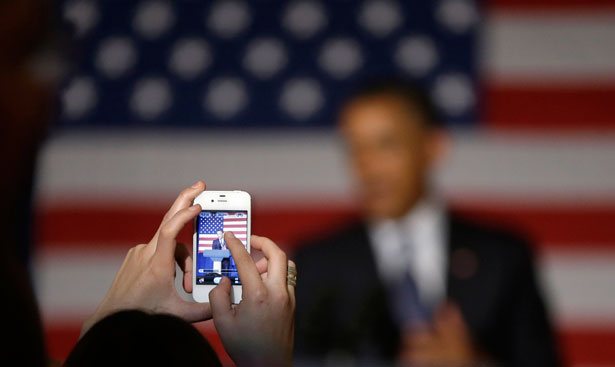
President Barack Obama. (AP Photo)
This story originally appeared at Truthdig. Robert Scheer is the author of The Great American Stickup: How Reagan Republicans and Clinton Democrats Enriched Wall Street While Mugging Main Street (Nation Books).
How do you justify criminally charging a government contractor for revealing an alarming truth that the public has every right to know? That is the contradiction raised by President Obama now that he has, in effect, acknowledged that Edward Snowden was an indispensable whistleblower who significantly raised public awareness about a government threat to our freedom.
Unfortunately, the president didn’t have the grace and courage to concede that precise point and remains committed to imprisoning Snowden instead of thanking him for serving the public interest. But Julian Assange, no stranger to unrequited integrity, nailed it. “Today, the president of the United States validated Edward Snowden’s role as a whistleblower by announcing plans to reform America’s global surveillance program,” the WikiLeaks founder said in a statement posted Saturday, the day after Obama’s remarks.
While boasting, “I called for a review of our surveillance programs,” Obama avoided the obvious fact that this review was compelled not by a sudden burst of respect for the safeguards demanded by our Constitution but rather Snowden’s action in making the public cognizant of the astounding breadth and depth of the National Security Agency’s spying program.
Once again, Obama managed to blame not those responsible for government malfeasance, himself included, but instead the rare insiders driven to do their duty to inform the American people. “Unfortunately, rather than an orderly and lawful process to debate these issues and come up with appropriate reforms, repeated leaks of classified information have initiated the debate in a very passionate but not always fully informed way,” he said.
How disingenuous, to put it mildly. Without the leaks, there would be no reforms. We, the voters, couldn’t initiate a debate about the wisdom of this extensive spying because the government officials who authorized it, from the president on down, kept us in the dark.
Those elected officials who were briefed on these nefarious programs never shared that information with the public, and most of them, led by California Democrat Dianne Feinstein, head of the Senate Intelligence Committee, have branded Snowden a traitor for exposing their own failure to protect our freedoms.
“I don’t look at this as being a whistleblower,” Feinstein said of Snowden in June. “I think it is an act of treason.” The senator added, “He took an oath—that oath is important. He violated the oath, he violated the law. It’s an act of treason in my view.”
What about Feinstein betraying her oath of allegiance to the US Constitution and its Fourth Amendment prohibiting “unreasonable searches and seizures”? If she judged the NSA program to be constitutional, why didn’t she reveal the scope of the operation to the spied-upon American public to let the voters decide? Instead, last year, Feinstein joined with the Obama administration in defeating amendments to the Foreign Intelligence Surveillance Act that would have compelled the NSA to reveal the extent of its spying.
A decent Democrat, Senator Jeff Merkley of Oregon, explained why the public needed the information that Feinstein would deny them. “Citizens generally assume our government is not spying on them,” he told U.S. News & World Report in December. “If they had any inkling of how this system really works, the details of which I cannot discuss, they would be profoundly appalled.”
But Feinstein’s contempt for the public’s right to know sustained people’s ignorance until Snowden took the courageous step of letting us in on the alarming details of this assault on our rights. The president was forced to reverse course, conceding for the first time that there is a problem, and advanced initiatives he claimed would better shield our liberties. Suddenly, defending those freedoms is our patriotic duty, as Obama acknowledged Friday, “because what makes us different from other countries is not simply our ability to secure our nation. It’s the way we do it, with open debate and democratic process.”
Why did it require the shocking Snowden revelations to get this president to recognize the danger to that democratic process resulting from the secret hearings of the FISC in which, as Obama put it, “One of the concerns that people raise is that a judge reviewing a request from the government to conduct programmatic surveillance only hears one side of the story, may tilt it too far in favor of security, may not pay enough attention to liberty.”
No kidding? But maybe the president now gets the point that the authors of our Constitution intended, a notion this Harvard-educated constitutional law professor claimed to understand when he was a senator attempting to rein in the unbridled power of the NSA. That Obama has been forced by public opinion to come to his senses on this issue, even in a limited way, is a tribute to the courage of Snowden, who should be honored as the poster boy for the right of the citizen to protest government injustice rather than be hunted as a fugitive.
Absurd as it sounds in this era of fear mongering, a presidential pardon for Snowden would bring honor to our country.
Chase Madar lays out seven myths about Edward Snowden.


